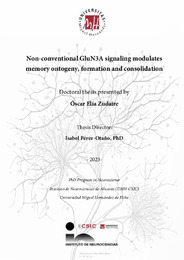Título :
Non-conventional GluN3A signaling modulates memory ontogeny, formation and consolidation |
Autor :
Elía Zudaire, Óscar |
Tutor:
Pérez Otaño, Isabel |
Editor :
Universidad Miguel Hernández |
Fecha de publicación:
2023-07-28 |
URI :
https://hdl.handle.net/11000/32134 |
Resumen :
During early brain development, an excess production of synapses occurs, resulting in the establishment of weak functional connections between neurons. Subsequently, neuronal activity refines the initial circuitry by strengthening and maintaining specific connections while suppressing (pruning) others. This process ultimately leads to the formation of more precise and long-lasting connections. Compelling evidence suggests that even subtle imbalances in synapse maturation and pruning can contribute to various severe brain disorders, including autism, schizophrenia, bipolar disorder, and neurodegenerative conditions that manifest in adulthood. GluN3A subunit-containing NMDA receptors (GluN3A-NMDARs) have emerged as crucial regulators of this synaptic refinement. GluN3A-NMDARs are typically expressed before and during critical periods of postnatal development. They play a role in preventing premature synapse maturation and stabilization until sensory experience occurs, subsequently targeting less utilized or non-active synapses for pruning.
Previous research from our lab have revealed that GluN3A-NMDARs exhibit selective inhibition of a specific subset of activity- and NMDAR-regulated signaling pathways. Among these pathways, the mTOR pathway, particularly the multiprotein complex mTORC1, stands out due to its crucial involvement in stimulating dendritic protein synthesis in response to synaptic signals.
Building on this work, here we investigated whether GluN3A-NMDARs impact cognition-related behaviors and the mechanisms through which they exert their effects. We found that GluN3A bi-directionally affects mice performance in contextual and associative learning tasks: deleting GluN3A enhances mice performance while increasing its expression impairs mice ability to form associative memories. To expand our investigation, we utilized genetic tools to further elucidate the role of GluN3A in memory processes. Through these tools, we were able to demonstrate that GluN3A exerts its influence on memory by being expressed in excitatory neurons. Importantly, we discovered that the impact of GluN3A on memory is not limited to critical periods of development but continues to be significant throughout adulthood. We also discovered that GluN3A limits cognitive behaviors by constraining mTORC1-signaling and that its deletion enhances long-term potentiation (LTP) in vivo.
To further our understanding, we studied postnatal and aged mice with ablated GluN3A expression. We found that removing GluN3A-NMDARs increased protein synthesis and accelerated the ontogeny of memories, limiting the temporal window of infantile amnesia and that GluN3A ablation protects against age-related memory loss. The findings presented in this thesis significantly contribute to our comprehension of the mechanisms through which GluN3A-NMDARs, impact the brain and influence behaviors essential for our interaction with the environment.
These results pave the way for novel avenues of research aimed at enhancing our understanding of NMDARs function. Moreover, our experiments provide compelling evidence supporting the therapeutic prospects of targeting GluN3A-NMDARs as a means to develop memory-enhancing treatments.
|
Palabras clave/Materias:
Neurociencias
Neurobiología |
Área de conocimiento :
CDU: Ciencias aplicadas: Medicina: Patología. Medicina clínica. Oncología: Neurología. Neuropatología. Sistema nervioso |
Tipo de documento :
info:eu-repo/semantics/doctoralThesis |
Derechos de acceso:
info:eu-repo/semantics/openAccess
Attribution-NonCommercial-NoDerivatives 4.0 Internacional |
Aparece en las colecciones:
Tesis doctorales - Ciencias de la Salud
|
 La licencia se describe como: Atribución-NonComercial-NoDerivada 4.0 Internacional.
La licencia se describe como: Atribución-NonComercial-NoDerivada 4.0 Internacional.
.png)
